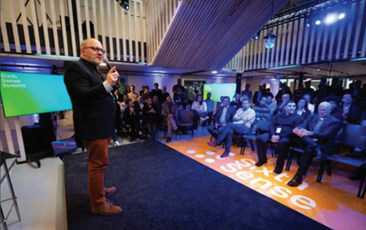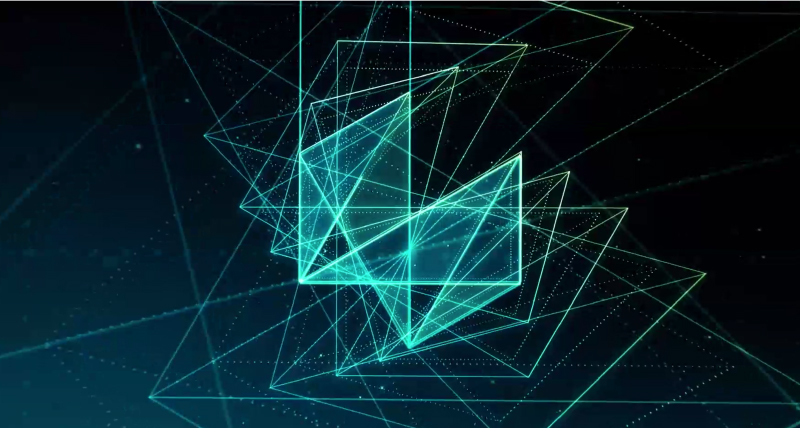Welcome to a sneak peek of the 2024 edition of Engineering Reality, a magazine dedicated to accelerating smart manufacturing. Published by Hexagon’s Manufacturing Intelligence division, this edition highlights human ingenuity, showcasing how engineering teams across various organisations harness manufacturing technologies for innovative applications.
In this article, discover how Hexagon’s startup incubation program is contributing to a more sustainable future in manufacturing. If you find this article interesting, explore the rest of the issue, featuring exclusive stories from Volvo, TE Connectivity, General Motors, Bosch, Archaeological Heritage Office Saxony and more.
Get your copy of Engineering Reality for the complete experience.
After applications from a highly competitive pool of start-ups were whittled down to the most innovative proposals and pitched to Hexagon’s panel of global experts, Sixth Sense has announced the nine manufacturing start-ups chosen for its third cohort.
First launched in early 2022, the Sixth Sense programme brings together scaling start-ups and world-class companies to share ideas and collaborate on solving some of humanity’s biggest challenges.
Previous cohorts have zeroed in on challenges in areas including visualisation and digital reality, AI and automation, and smart manufacturing.
This latest cohort was announced at a Showcase Day event on 20 September, with the start-ups selected distinguishing themselves with ground-breaking solutions to some of today’s most critical manufacturing challenges.
“For this third cohort, we’ve been on the hunt for new innovations that enable manufacturing leaders to lead the net-zero transition — especially with sustainable product design — and we’re thrilled with the calibre of the start-ups we’ve found to participate,” said Josh Weiss, president of Hexagon’s Manufacturing Intelligence division.
Centring on two challenge areas, “Building a sustainable manufacturing future” and “Smart digital reality for collaborative manufacturing,” the chosen companies — which hail from seven countries — offered unique approaches to improving product sustainability, eliminating waste, capturing real-time data, automating design, and incorporating robots into production lines.

Milan Kocic at Sixth Sense Summit in The Hague on Feb 1st 2023, where eight Cohort 2 companies presented the culmination of their work
As part of the Sixth Sense programme, the nine start-ups will embark on an intensive 16-week journey to refine their offerings in close collaboration with Hexagon. They will learn from Hexagon’s market insights, accumulated over decades of partnership with industry-leading technology giants, to accelerate their journey to commercial success.
At the end of the programme, three winners will be selected from the cohort, granting them access to Hexagon’s extensive resources for global expansion, including potential funding, worldwide office space, and Hexagon’s comprehensive suite of products and services. Additionally, they will be showcased on Hexagon’s open digital reality platform for manufacturing, Nexus, providing them access to world-class companies.
“Each of these start-ups has demonstrated their capacity to address pressing manufacturing challenges with creativity and determination,” said Milan Kocic, Head of Sixth Sense. “Much like our previous cohorts have addressed critical industry challenges, we believe these innovators will play a crucial role in shaping a sustainable future for the manufacturing industry.”
The third cohort’s journey through the Sixth Sense programme is just beginning — follow their progress at sixthsense.hexgon.com and learn more about each of them below.
Sixth Sense Cohort 3 Finalists |
|
| Acerta Analytics, Canada | Acerta Analytics provides advanced analytics solutions that leverage machine learning and artificial intelligence (ML/AI) to turn complex product data into actionable insights. The solution enables automakers and suppliers of complex vehicle parts to improve quality in manufacturing processes and support early defect detection. |
| Circularise, Netherlands |
Circularise offers digital product passports for end-to-end traceability and secure data exchange in industrial supply chains. Their technology helps companies achieve transparency and sustainability by tracking the lifecycle of products and materials. |
| Dessia, France |
Dessia offers a platform featuring virtual “bots” that serve as companions to assist engineers in designing mechanical systems. These virtual assistants provide support and insights throughout the design process. |
| Flexxbotics, Boston, US |
Flexxbotics specialises in enabling high-mix automation-intensive manufacturers to create flexible next-generation machining environments. They utilise their breakthrough FlexxCORE™ technology to seamlessly connect and coordinate collaborative robots with existing automation equipment, IT systems, and personnel to deliver autonomous process control. |
| Launchpad, Los Angeles, US |
Launchpad utilises AI and advanced simulation technologies to automate aspects of the design, procurement, and manufacturing process. They focus on concepts like mass customisation, micro-factories, and software-defined robotics to create shorter supply chains, reduce waste, and deliver new features faster in the manufacturing industry. |
| Rafinex, Luxembourg |
Rafinex’s ground-breaking innovation is the AI stochastic topology optimisation for safe, lightweight designs. This technology actively manages uncertainty and risks of real-life variability to create uniquely robust designs that remain safe even in off-design load conditions for application in safety-critical performance sectors such as aerospace, automotive, and tooling. |
| RV Magnetics, Slovakia |
RV Magnetics has developed the world’s smallest passive sensor based on MicroWire technology. This sensor combines unique capabilities from electromechanics, electronics, chemistry, physics, applied magnetism, and industrial design, offering diverse applications. |
| ToffeeAM, UK |
ToffeeAM provides state-of-the-art multi-physics generative design software for engineering. Their mission is to empower engineers to optimise engineering components and systems efficiently, enabling them to go further and faster in their design processes. |
| Zaptic, UK |
Zaptic provides job instruction and collaboration tools for front-line teams, along with a no-code toolkit designed to accelerate the digital transformation of daily operations. Their solutions help organisations streamline processes and improve communication among their front-line workers. |

















